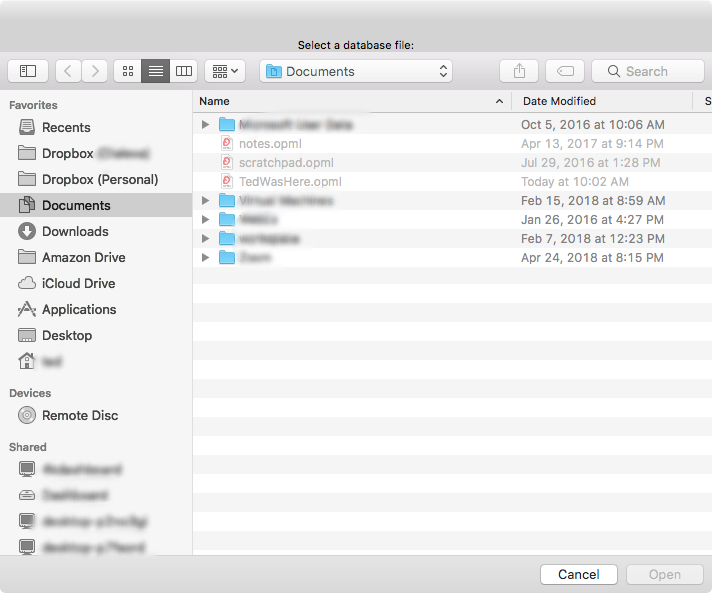"Full Distribution" Download Can't find opml.root
tedchoward opened this issue · 14 comments
For some reason, the "Full Distribution" download is unable to find opml.root.
Steps:
- Download
OPML-full-distribution.dmg - Double-click
OPML-full-distribution.dmg - Drag
OPMLfolder to/Applications - Double-click
/Applications/OPML.app
Expected behavior:
- OPML editor launches and starts working
Workaround (launch from terminal):
- Launch Terminal.app
- type
cdand drag the/Applications/OPMLfolder to the terminal window - type
./OPML.app/Contents/MacOS/OPML - Press return
I don't know why he workaround works and double-clicking the app bundle doesn't.
FWIW: The release works fine on my machine until I upload to Github. The files I download from Github have this problem.
@tedchoward https://gist.github.com/mrDarcyMurphy/bc488c261883866ac504062ecc163bb3
I saw the same thing, so ran the app a few different ways and posted the logs to the gist above. Hope it helps.
@mrDarcyMurphy Thanks! I appreciate that.
I have a new workaround:
- Download the "Full Distribution" DMG
- Double-click
OPML-full-distribution.dmg - Drag
OPMLfolder somewhere (e.g./Applications, the desktop) - Double-click
OPMLfolder - Drag
OPML.appto the Desktop - Drag
OPML.appback to theOPMLfolder - Double-click
OPML.app
@tedchoward Cool. I'll try it out when I get the chance. In the meantime, I noticed you may have a hard coded path. Check this line.
- I had a theory that the application bundle was getting the wrong path.
- How does the kernel find the root database file?
- Short answer: It looks in the same directory as the running application bundle.
- I published v10.2d4 which logs out the path to the application bundle when it tries to find the root database.
- It confirmed my suspicions
Apr 30 11:46:24 TedBook-Pro OPML[10764]: bundle url = file://localhost/var/folders/rw/2xy3lr9d0l7gvxprcm9vblth0000gn/T/AppTranslocation/FCD3E2C1-7C19-4010-896E-29F986FF2821/d/OPML.app/
- It appears that macOS is copying the application to a "secure" location before executing it.
- Therefore the application can't find the root database file
- For some reason, copying the application bundle to a new location, and then copying it back causes macOS to stop doing this.
The "Security Feature" causing this headache is called App Translocation, and is part of macOS's Gatekeeper as of macOS 10.12 (Sierra)
https://weblog.rogueamoeba.com/2016/06/29/sierra-and-gatekeeper-path-randomization/
I'm going to close this issue, because there's nothing I can do about it.
I have updated the README.md file with instructions to download the OPML folder separately from the application bundle. This effectively works around the problem.
I have also removed all "Full Distribution" downloads from the Releases page.
I commented on another ticket about this, but in case it helps someone looking for a solution, you can do something like:
Command to remove translocation from an application in Mac OS High Sierra
xattr -dr com.apple.quarantine "/Applications/[application].app"
to remove the app translocation from the application bundle. (Obviously, you would replace [application] with the name of the actual application...)
It runs, but unable to open opml.root. Using the Terminal launch method workaround above, It aborts with following messages:
Maysons-iMac:OPML maysonlancaster$ ./OPML.app/Contents/MacOS/OPML
dyld: lazy symbol binding failed: Symbol not found: _OTLIFOStealList
Referenced from: /Applications/OPML/./OPML.app/Contents/MacOS/OPML
Expected in: /System/Library/Frameworks/ApplicationServices.framework/Versions/A/ApplicationServices
dyld: Symbol not found: _OTLIFOStealList
Referenced from: /Applications/OPML/./OPML.app/Contents/MacOS/OPML
Expected in: /System/Library/Frameworks/ApplicationServices.framework/Versions/A/ApplicationServices
Abort trap: 6
Also, got the 32-bit (I believe) warning that it's not optimized and won't run in future versions.
same warning as maysonicboom above..
Guys this isn't a bug report -- we know that Mojave is the last version of Mac OS that runs Frontier.
It runs on Mojave. It's a 32 bit app. Apple has told us that Mojave is the last version of macOS to support 32 bit apps.
